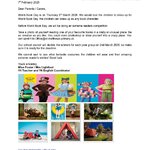Welcome to our RE Page
At St Matthew's Primary School, we follow the Religious Education Syllabus (Questful RE) which has been devised and recently updated by Blackburn Diocese. Questful RE is an enquiry based, balanced RE Curriculum which was adopted in 2018. This curriculum involves explicit teaching of Christian concepts and God’s big salvation story. It provides children with a deeper understanding of Christianity. Through an investigative enquiry approach, pupils are given the opportunity to explore other major religious and world views. Each unit incorporates a large number of key questions, which will enable children to deepen their understanding about themselves, their relationships with others, their relationship with the world and their relationship with God. We believe that a high quality Religious Education (RE) is important in enabling every child to flourish.
What we will learn
Attitudes and Skills in RE
It is vital that religious education encourages pupils to develop positive attitudes to their learning and to the beliefs and values of others. The following four attitudes are essential for good learning in religious education and will be developed at each stage or phase of religious education:
• self-awareness
• respect for all
• open-mindedness
• appreciation and wonder
Self-awareness in religious education includes pupils:
• feeling confident about their own beliefs and identity and sharing them without fear of embarrassment or ridicule;
• developing a realistic and positive sense of their own religious, moral and spiritual ideas;
• recognising their own uniqueness as human beings and affirming their self-worth;
• becoming increasingly sensitive to the impact of their ideas and behaviour on other people.
Respect for all in religious education includes pupils:
• developing skills of listening and a willingness to learn from others, even when others’ views are different from their own;
• being ready to value difference and diversity for the common good;
• appreciating that some beliefs are not inclusive and considering the issues that this raises for individuals and society;
• being prepared to recognise and acknowledge their own bias;
• being sensitive to the feelings and ideas of others.
Open-mindedness in religious education includes pupils:
• being willing to learn and gain new understanding;
• engaging in argument or disagreeing reasonably and respectfully (without belittling or abusing
others) about religious, moral and spiritual questions;
• being willing to go beyond surface impressions;
• distinguishing between opinions, viewpoints and beliefs in connection with issues of conviction
and faith.
Appreciation and wonder in religious education includes pupils:
• developing their imagination and curiosity;
• recognising that knowledge is bounded by mystery;
• appreciating the sense of wonder at the world in which they live and developing their capacity to respond to questions of meaning and purpose.
Pupils’ learning about the content of RE takes place alongside the development of their skills. In RE pupils need general skills such as gathering information, expressing ideas or evaluation sources. There are some skills that RE particularly needs to develop and use. These include investigating, expressing, interpreting, reflecting, empathising, applying, discerning, analysing, synthesising and evaluating.
If you would like any further information please contact the school office.
Right of Withdrawal
This was first granted when RE was actually religious instruction and carried with it connotations of induction into the Christian faith. RE is very different now – open, broad and exploring a range of religious and non-religious worldviews.
However, parents have the right to withdraw their children from the RE lessons or any part of the RE curriculum and the school has a duty to supervise them, though not to provide additional teaching or to incur extra cost. Where the child has been withdrawn, the law provides for alternative arrangements to be made for RE of the kind the parents want the child to receive. These arrangements will be made by the parents; the school is not expected to make these arrangements. This could be provided at the school in question, or by another school in the locality. If neither approach is practicable, the child may receive external RE teaching as long as the withdrawal does not have a significant impact on the child’s attendance. Schools should have a policy setting out their approach to provision and withdrawal. More guidance on withdrawal can be found in Religious Education in English schools: non-statutory guidance 2010, available online at www.gov.uk/government/publications/religiouseducation-guidance-in-english-schools-non-statutoryguidance-2010
If parents wish to withdraw their child(ren) from RE lessons, they must speak to the Headteacher.




.png)
